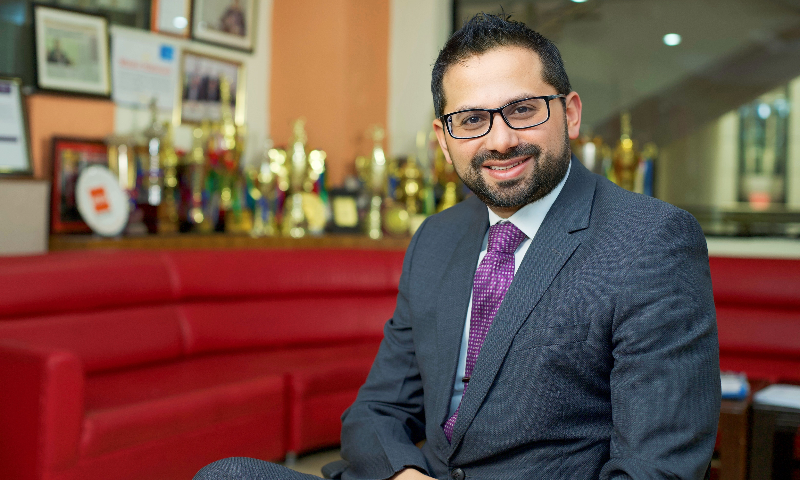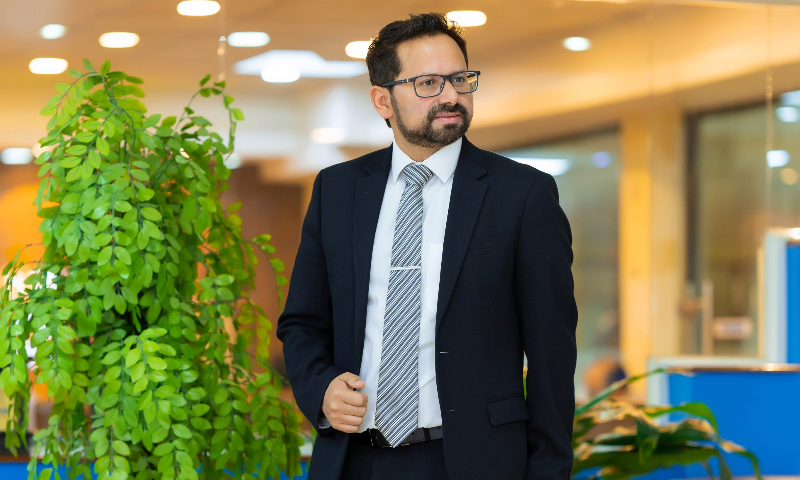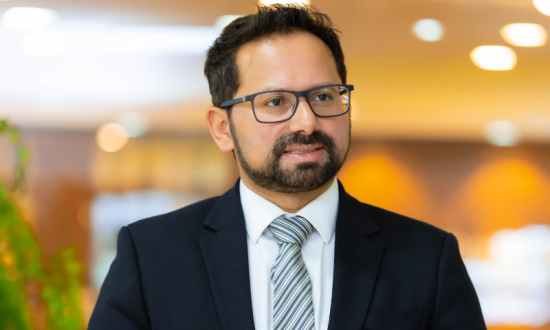Mr. Rajen Kandel is a British Nepali businessman and entrepreneur. He is the Managing Director of the Kandel Group UK and its subsidiaries. Mr. Kandel has achieved his BSc in Computing from the University of Greenwich and his MBA in Higher Education Management from the prestigious Institute of Education at University College London (No. 1 in the world in Education QS University rankings). Mr. Kandel has a successful record of leading startups, particularly in education, the Kandel Group is a selective investment firm with a core focus on global education, healthcare sectors, and property investment – specialising in emerging industries and markets centered in South Asia, the Middle East, and the UK.
In a recent interview with Digital First Magazine, Rajen Kandel discussed his experience as a Managing Director. He shared his expertise in multiple sectors, including real estate, healthcare, education, trends and opportunities, and more.
Can you briefly overview the career journey that led you to become a Managing Director with expertise in multiple sectors, including real estate, healthcare, and education?
Throughout my career journey, I have amassed diverse and enriching professional experiences that have uniquely shaped my role as a Managing Director, showcasing expertise across multiple sectors. Commencing as an IT Manager, I developed a solid foundation in IT skills, fostering a passion for technology within the Education sector. Transitioning to real estate, I achieved noteworthy milestones, honing my skills and successfully navigating industry challenges. In the healthcare sector, our team played a vital role during the Covid times, contributing to the success of Woolwich Late Night Pharmacy and receiving recognition for the Covid vaccination programme. Further expanding into the education sector, I assumed key roles and broadened my expertise. As a Managing Director, my overarching goal is to leverage this wealth of experience to drive innovation, foster growth, and achieve exceptional results across sectors, reflecting my commitment to making a meaningful impact in my current leadership role.
As a Managing Director, you oversee operations within your industry. Could you describe the scope of your responsibilities and the challenges you face in this role?
As the overseer of operations in my industry, my role encompasses strategic leadership, operational management, financial oversight, stakeholder engagement, team leadership, risk management, and fostering innovation and growth. This involves providing strategic direction, optimising day-to-day operations, managing budgets, cultivating stakeholder relationships, leading a high-performing team, addressing risks, and identifying opportunities for business expansion. I grapple with challenges such as navigating dynamic market conditions, attracting and retaining top talent, adapting to industry changes, managing financial pressures, operating in a global context, and incorporating sustainable practices. In essence, my responsibilities involve harmonising strategic vision, operational excellence, and effective leadership to guide the organisation toward sustained success amid the challenges inherent in our dynamic industry.
What trends and opportunities do you see in the real estate market that are shaping your strategic decisions?
In the dynamic real estate market, our strategic decisions are influenced by key trends and opportunities. We embrace technology integration, emphasising virtual reality, artificial intelligence, and blockchain for enhanced property management. Sustainable practices, including eco-friendly initiatives and energy-efficient designs, play a crucial role in shaping property development. The rise of remote work impacts property preferences, driving demand for homes and a shift towards suburban or rural living. Data-driven decision-making is integral, utilising big data and analytics for market research and informed decision-making in property acquisition and pricing strategies. Opportunities include addressing affordable housing demands, contributing to smart city development, capitalising on e-commerce growth, and exploring adaptive reuse of existing properties. Our strategic decisions focus on innovation, sustainability, market flexibility, and data-driven strategies to enhance the real estate experience, align with societal expectations, adapt to market changes, and stay ahead of evolving trends. These considerations guide our agile and responsive approach to navigating the ever-evolving real estate landscape.

Real estate is a complex and dynamic industry. How do you leverage your expertise in real estate to drive business growth and innovation in your current role?
In my current role, I appreciate the acknowledgment of the real estate industry’s complexity and dynamic nature. Leveraging my expertise in real estate, I prioritise driving business growth and fostering innovation through a comprehensive approach. This includes developing a strategic vision based on in-depth market knowledge, monitoring market dynamics and emerging opportunities, and employing innovative development strategies such as sustainable designs and smart technologies. Data-driven decision-making is integral, utilising analytics for informed choices on property acquisition, pricing, and market positioning. Collaborating with key stakeholders ensures holistic and innovative project development, while a customer-centric approach prioritises understanding evolving needs. Integration of sustainable practices, technological advancements, and fostering an organisational culture of agility and adaptability are key elements. By incorporating these strategies, my aim is to position our organisation at the forefront of innovation in the real estate sector, ensuring sustained growth and meeting the evolving needs of stakeholders.
What innovative strategies or solutions have you implemented in the educational sector to address challenges such as digital learning, curriculum development, or student engagement?
In my capacity, I have proactively tackled challenges in digital learning, curriculum development, and student engagement through innovative solutions. This has involved introducing and integrating robust digital learning platforms, ensuring a seamless transition to virtual classrooms, and implementing blended learning approaches for a flexible and personalised learning experience. I have utilised data analytics to track student progress and modernised curricula in alignment with industry trends, incorporating real-world applications through collaboration with industry professionals. Initiatives such as project-based learning, student-centric engagement strategies, and inclusive education practices contribute to a dynamic learning environment.
Notably, The British College, Kathmandu, has spearheaded significant initiatives, including the launch of a Cybersecurity course in 2021, the organisation of Nepal’s first AI conference in 2019, the establishment of the first IoT lab in 2022 with joint projects between Nepalese and British students, and the inauguration of the first Virtual Reality lab in Nepal in 2023. These pioneering efforts underscore the institution’s commitment to addressing the country’s pressing needs in cybersecurity and advancing technology-related education, marking it as a trailblazer in the educational landscape of Nepal.
Can you share insights into how the experiences and lessons from one sector have influenced your decision-making in another?
My professional approach revolves around the integration of insights across sectors, serving as a fundamental pillar in shaping decision-making across diverse fields. Cross-functional problem-solving skills acquired in the Media industry have proven instrumental in addressing challenges within the Education sector, enhancing my capacity for innovative solutions. Exposure to dynamic markets in Healthcare has cultivated strategic adaptability, enabling effective responses to changes in Real Estate and guiding proactive decision-making. Insights gained from understanding customer needs in healthcare have translated into a customer-centric approach in the Education industry, contributing to improved products/services and heightened satisfaction. Technological innovations from the Education sector have streamlined operations and guided decisions regarding digital transformation. Experience in risk management in one sector provides a foundation for effective risk management in another, contributing to proactive compliance and mitigation strategies. Leadership experiences have played a key role in building high-performing teams across sectors, influencing a positive organisational culture. Exposure to sustainable practices has influenced the integration of environmentally conscious initiatives, contributing to corporate social responsibility and ethical decision-making in diverse environments. By synthesising lessons learned across sectors, my goal is to bring a holistic and innovative perspective to decision-making, fostering adaptability and driving success.
What leadership principles or strategies do you consider most important for successfully managing and leading in these diverse sectors?
Successfully leading in diverse sectors requires a blend of adaptable and effective leadership approaches, incorporating key principles and strategies. Recognizing the dynamic nature of diverse sectors, adaptability and flexibility are crucial, with leaders ready to pivot strategies in response to evolving market conditions. Foundational to this is the development of a clear strategic vision aligned with sector goals, coupled with fostering strategic planning processes encompassing both short-term and long-term objectives. Open and transparent communication, an empowering and inclusive leadership style, and a focus on risk management are paramount. Encouraging a culture of continuous learning, innovation, and collaboration across teams and sectors is vital. A customer-centric approach, ethical decision-making, and a results-oriented leadership style contribute to sustained success. By integrating these principles, I aim to cultivate a cohesive and high-performing organisational culture that can adapt to the unique challenges and opportunities presented by diverse sectors.

What are your predictions for the future of these industries – real estate, healthcare, and education? How do you plan to stay ahead of the curve in each of them?
Anticipating and preparing for industry trends is paramount for sustainable success across sectors. In real estate, I predict a continued embrace of technology, focusing on sustainable and smart urban development. To stay ahead, I plan to invest in innovative construction technologies, incorporate sustainable practices, and leverage smart technologies for efficient property management. In healthcare, I foresee increased integration of telemedicine, personalised treatments, and data-driven healthcare management. Staying ahead involves adopting advanced healthcare technologies, fostering partnerships with telemedicine providers, and prioritising data security. Regarding education, the future involves a hybrid model with a greater emphasis on lifelong learning. To stay ahead, I plan to invest in online learning platforms, promote continuous professional development for educators, and collaborate with industry leaders for curriculum relevance. Common strategies for staying ahead include continuous industry monitoring, agile decision-making, strategic partnerships, investment in innovation, talent development, a customer-centric approach, and regulatory compliance. By adhering to these strategies, I aim to position our endeavours at the forefront of industry evolution, actively contributing to shaping the future of these dynamic sectors.
How do organizations prepare for uncertainties and disruptions, and what guiding principles inform their strategic planning for the industry’s future?
Successfully navigating uncertainties demands a combination of preparedness, adaptability, and strategic foresight. Key considerations include conducting comprehensive risk assessments and engaging in scenario planning guided by proactive principles, prioritising agility and adaptability in strategic planning, continuous environmental scanning to stay informed about industry impacts, investing in technology and innovation with a focus on digital transformation, developing robust crisis management plans and contingency strategies, fostering cross-functional collaboration, maintaining a customer-centric focus, and acknowledging the importance of a skilled and resilient workforce. Guided by these considerations and principles, organisations enhance their ability to weather uncertainties, position themselves for sustainable success, and thrive amid industry evolution.
In conclusion, what advice would you give to aspiring leaders and professionals who aim to excel in different industries like real estate, healthcare, and education while embracing strategic planning and leadership?
In conclusion, for aspiring leaders and professionals seeking success across diverse industries like real estate, healthcare, and education, my advice revolves around key principles. Embracing lifelong learning is paramount for staying ahead, and fostering a continuous education mindset. Developing cross-functional skills promotes adaptability and innovative problem-solving. Building a strong network across sectors provides valuable insights and collaborative opportunities. Agility and adaptability are crucial traits for navigating uncertainties, while ethical leadership, resilience, and a focus on technology and innovation contribute to sustained success. Prioritising stakeholder engagement, cultivating a strategic mindset, and leading with empathy enhance organisational impact. The journey to excellence involves dedication, a commitment to growth, and the integration of these principles to navigate industry complexities, contribute to strategic planning, and lead with lasting impact.






